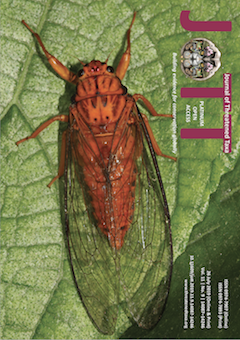Pollination ecology of Brownlowia tersa (Malvaceae), a Near Threatened non-viviparous true mangrove shrub
DOI:
https://doi.org/10.11609/jott.4906.11.9.14119-14127Keywords:
Facultative xenogamy, hermaphroditism, melittophilyAbstract
Brownlowia tersa is a low-ground semi-evergreen shrub species. The phenological events occur sequentially—leaf fall, leaf flushing, flowering and fruiting from April to November. It is hermaphroditic, protandrous, self-compatible, facultative xenogamous, and melittophilous involving worker honey bees, small male and female carpenter bees and male and female cuckoo bees. Of these, worker honey bees and female carpenter bees forage for both pollen and nectar while male carpenter bees and both sexes of cuckoo bees forage exclusively for nectar. Cuckoo bees are very important for cross-pollination because they are swift fliers and visit many flowers from different plants in the shortest time. Carpenter bees and honey bees are largely important for self-pollination as they are not fast fliers and tend to spend more time at each flower for forage collection. The flowers have a specialized pollination mechanism to resort to autonomous autogamy if not pollinated but this mode of pollination is subject to the availability of pollen in its own anthers. Fruit is a 1-seeded follicle produced from a single carpel of the flower. It is indehiscent and floats in tidal water when detached from the plant. When settled in muddy substratum, it breaks open to expose the seed which germinates and produces a new plant in quick succession. The study reports that the plant is highly threatened due to different human economic activities taking place in the area and hence immediate in situ conservation measures are required for its protection and propagation.
Published
Issue
Section
License
Authors own the copyright to the articles published in JoTT. This is indicated explicitly in each publication. The authors grant permission to the publisher Wildlife Information Liaison Development (WILD) Society to publish the article in the Journal of Threatened Taxa. The authors recognize WILD as the original publisher, and to sell hard copies of the Journal and article to any buyer. JoTT is registered under the Creative Commons Attribution 4.0 International License (CC BY), which allows authors to retain copyright ownership. Under this license the authors allow anyone to download, cite, use the data, modify, reprint, copy and distribute provided the authors and source of publication are credited through appropriate citations (e.g., Son et al. (2016). Bats (Mammalia: Chiroptera) of the southeastern Truong Son Mountains, Quang Ngai Province, Vietnam. Journal of Threatened Taxa 8(7): 8953–8969. https://doi.org/10.11609/jott.2785.8.7.8953-8969). Users of the data do not require specific permission from the authors or the publisher.





